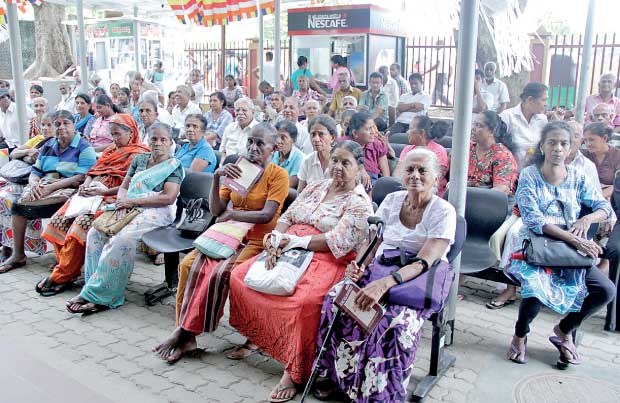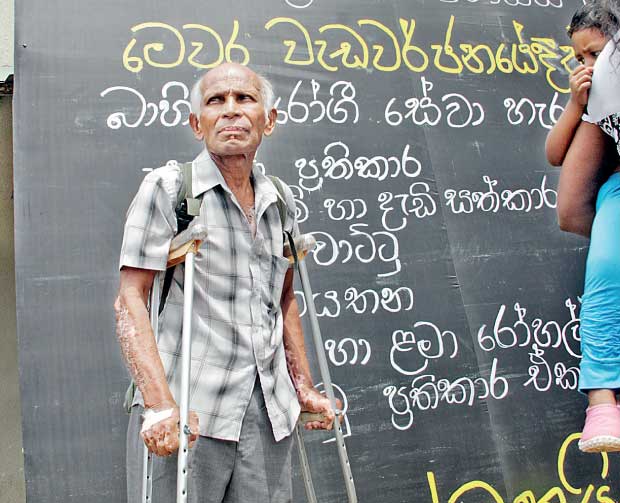Reply To:
Name - Reply Comment
Last Updated : 2024-04-19 00:03:00
 Legality of strikes has been derived from the Constitution of Sri Lanka, ILO Conventions No. 87 and 98 and Trade Union Ordinance No. 14 of 1935 and subsequent amendments thereto.
Legality of strikes has been derived from the Constitution of Sri Lanka, ILO Conventions No. 87 and 98 and Trade Union Ordinance No. 14 of 1935 and subsequent amendments thereto.
Chapter III under Fundamental Rights Article No. 14(1)-(c) and (d) of the Constitution of Sri Lanka states every person is entitled to the Freedom of Association and the Freedom to form and join a trade union.
Articles 15(4) of Chapter III of the Constitution provides “the exercise and operation of the Fundamental Rights declared and recognized by Article 14(1)-c should be subject to such restrictions as may be prescribed by law in the interest of racial or religious harmony or national economy”.
Articles 15(7) of Chapter III of the Constitution states “the exercise and operation of all the Fundamental Rights declared and recognized by Article 14 shall be subject to such restrictions as may be prescribed by Law in the interest of national security, public order and protection of public health or morality or for the purpose of securing due recognition and respect for the right and freedom of others or of meeting the just requirements of the General Welfare of a democratic society. For the purpose this paragraph law includes regulation made under the law for the time being relating to Public Security.”
ILO Convention No. 87 specify the Freedom of Association and protection of the right to organize which are directly related to formation of Trade Unions. ILO Convention 98 specify right to organize and collective bargaining.
The definition of Trade Union given in the Trade Union Ordinance is that “Trade Union is an association or combination of workmen or employers whether temporary or permanent having among its objectives one or more of the following.
(a) The regulation of relations between workmen and employer or between employers and employers or
(b) The imposing of restrictive conditions on the conduct of any trade or business
(c) The representation of workmen or employers in trade dispute or
(d) The promotion or organization or financing of strikes or lock outs in any trade or industry or the provisions of pay or other benefits for its members during a strike or lock out
In this article the writer concentrates only on trade unions of workmen, not the trade unions of employers. It may be noted that any trade union action which includes strikes as well is warranted by law, if that action of trade union is fitted into one of the objectives of Trade Unions above referred to. 
In the Industrial Disputes Act, the definition of workmen states that he is a person who has a contract to work for an employer. In terms of Trade Union Ordinance every Trade Union shall apply for registration. If a Union is unregistered in terms of section 18 of the Ordinance it is an unlawful association. Such unlawful association cannot organize a strike.
The GMOA should be fitted into the above legal framework defined in the Trade Union Ordinance to legitimize its strikes. However demands proclaimed by the GMOA to be achieved through strike do not fall within the ambit of Trade Union objectives above referred to.
Here the question is that the GMOA has declared strike over a policy decision taken by Government based on the concept of Public Private Participation (PPP) in furtherance of development and advancement of Medical Education in this country. In terms of Article 2(h) of Chapter VI under the title “Directive Principles of State Policy and Fundamental Duties” the Government is bound by the Constitution for making policy decisions on development and advancement of any sector of education whether it is medical or any other sector. The GMOA has no right to challenge this principle secured in the Constitution of Sri Lanka.
It is a matter of policy to be decided by the Government whether private medical colleges are to be established and the mechanism on how it is to be done. In this exercise the standard of medical degree courses to be conducted by private medical colleges may be set by an internationally recognized body specialized in that discipline in concurrence with the SLMC. This responsibility should not be entrusted exclusively with the SLMC due to the fact that it seemed already prejudiced on this issue. Being a trade union, the GMOA has no right to dictate terms on the above procedure.
Under the essential Public Services Act No. 61 of 1979 and subsequent amendments thereto where the President is of the opinion that any service provided by any category of persons employed by any Government Department which is engaged in the provision of any of the services specified in the schedule to the Act is likely to be impeded or interrupted and the maintenance of the services provided by the category or persons is essential to life of the community, the President may in consultation with the line ministry by order published in the Gazette, declare their services to be an essential public service. The schedule to the Act above referred to, inter alia covers hospital services as well.
 In terms of the provisions above referred to in the Essential Public Services Act the President could proclaim by Gazette Notice that the health service is an essential service and could seek a writ from the apex body of the Judiciary on the legality of a strike launched by the GMOA.
In terms of the provisions above referred to in the Essential Public Services Act the President could proclaim by Gazette Notice that the health service is an essential service and could seek a writ from the apex body of the Judiciary on the legality of a strike launched by the GMOA.
Even where the strike is legal it may be unjustified depending on the circumstances of each case.
Any major prolonged strike can dislocate the existing order of the Government and the public life. It could cause considerable hardships to the general public specifically indigent patients and their families and the community at large.
It is a demonstrated fact that the GMOA manipulates the student population, mainly university students, recurrently as an arm to pressurize the Government on this issue which has caused a disastrous impact among students, university education and the general public at large. University students have lost their prospects on employability due to this absurd behaviour and they have become an eternal burden to the whole nation.
In judging of the justifiability of a strike the fairness and reasonableness of the demand made by the union would be a relevant factor. In case of the GMOA strike, the demands made by the union such as the Government should give up its right to make policies on medical education, to give up the proposed Free Trade Agreement, ETCA etc. are considered nothing but unfair.
It is also necessary to consider whether the demands in question were made with a view to improve the terms and conditions of service or were made with some other purpose. In contrast it has been observed that the purpose of making such demands seems nothing but to pressurize the Government to dance according to the tune set by the GMOA, where the ulterior motive is to topple the Government.
The statutory definition of a strike in Sri Lanka is given in the Trade Union Ordinance. It says strike is “the cessation of work by a body of persons employed in any trade or industry acting in combination or a concerted refusal, or a refusal under a common understanding of any number of persons who are, or have been so employed to continue to work or to accept employment” Right to strike is one of the most fundamental rights engaged by employees and their unions. One of the limitations that exists on this right is that the demands made by the Union should be based on an industrial dispute (in case of the GMOA the demand should directly be relevant to terms and conditions of employment of its members as doctors).
If the objective of a demand made by a union is not the furtherance of a trade dispute within the industry concerned (in case of the GMOA, its demands are not directly connected to the terms and conditions of employment of its members) instead demands are based on political objectives, such a strike is considered as a political strike.
Since the GMOA has launched a programme to promote its strike in combination with the support of other trade unions in different sectors, it is observed that the strike launched by the GMOA could be considered as a rehearsal for a general strike.
There is no doubt about the fact that trade unions have a right to strike. Sir John Simon an eminent lawyer and one time Attorney General of UK, addressing the Parliament on a situation emerged due to a general strike launched some years ago in UK stated, “In a society as we have it and as it is likely to remain, the right to strike is a very precious one which everybody who follows British institutions should acknowledge and defend…….. The plain fact is not as a matter of narrow law, but as a matter of broad fundamental constitutional principle that once you get the proclamation of a General Strike, it is not properly understood as a strike at all, because a strike is a strike against employers to compel employers to do something, but a general strike is a strike against the general public, to make the Public, Parliament and the Government do something.”
What is the broad fundamental constitutional principle which does not ratify a general strike although the right to strike is a precious one? It is people’s sovereignty entrusted with a democratically elected Government. It simply means the people’s sovereignty cannot be challenged by the right to strike.
In other words a general strike is a strike that dictates terms and conditions over a democratically elected Government and the people at large, to surrender to the demands posed by the unions, irrespective of their adverse repercussions.
Today the Government of Sri Lanka is committed to a policy of vigorous development, growth and refurbishment of an equalitarian society. In that context Trade Unions such as the GMOA may have to re-examine their role from the traditional trade union actions of agitation, confrontation and strikes, to one of co-determination and collective bargaining to achieve their own genuine demands, sans abuse of right to strike in order to cater for political or personal agendas of disgruntled politicians. Otherwise the right to strike would no sooner be nothing but a hollow effort.

Add comment
Comments will be edited (grammar, spelling and slang) and authorized at the discretion of Daily Mirror online. The website also has the right not to publish selected comments.
Reply To:
Name - Reply Comment
On March 26, a couple arriving from Thailand was arrested with 88 live animal
According to villagers from Naula-Moragolla out of 105 families 80 can afford
Is the situation in Sri Lanka so grim that locals harbour hope that they coul
A recent post on social media revealed that three purple-faced langurs near t